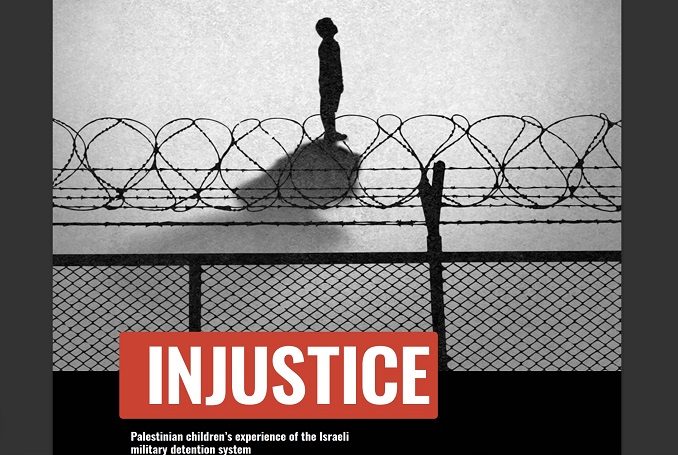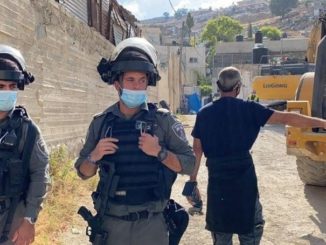
According to a just-released report by the international rights organization, Save the Children, four out of five Palestinian children in the Israeli military detention system are beaten and 69 per cent are strip-searched.
The research found that nearly half – 42 per cent – are injured at the point of arrest, including suffering gunshot wounds and broken bones.
Worse, some report violence of a sexual nature and some are transferred to court or between detention centers in small cages, the child rights organization said.
New Evidence
The new research comes as the UN Special Rapporteur on the situation of human rights in the Palestinian territories occupied since 1967 presents evidence today to the Human Rights Council on Palestinian children in detention.
It is estimated that there are between 500 and 1,000 children held in Israeli military detention each year.
Jason Lee, Save the Children’s country director in the occupied Palestinian territory, said:
“There’s simply no justification for beating and stripping children, treating them like animals or robbing them of their futures. This is a child protection crisis that can no longer be ignored. There must finally be an end to this abusive military detention system.”
Save the Children and a partner organization consulted 228 former child detainees from across the occupied West Bank, detained for a period of between one and 18 months, and found that most children are beaten, handcuffed and blindfolded during arrest.
“They are also interrogated at unknown locations without the presence of a caregiver, and are often deprived of food, water and sleep, or access to legal counsel,” according to the research.
The main alleged crime for these detentions is stone throwing, which can carry a 20-year sentence in prison for Palestinian children.
Khalil, who was detained when he was 13 and whose name has been changed, said that he did not receive essential healthcare.
He said,
“I had an injury in my leg, I had a cast, and had to crawl to be able to move. I felt my body being torn apart. I had no canes to help me walk, I kept asking soldiers for help during the transfer, but no one helped me.”
He continued,
“The soldier threatened to kill me when he arrested me for the second time. He asked me, ‘Do you want the same fate as your cousin?’ as he had been killed. He promised me that I would have the same fate and die, but that he would send me to prison first. He told me that he’s coming back for me – and every day, I wait for that day to come.”
Some children reported being coerced into falsely incriminating others in order to be freed.
As a result of the abuse, the report warned, children are increasingly unable to fully return to their normal life following release from detention,
“ .. with the number of children having frequent nightmares rising from 39% to 53% and those suffering from insomnia or difficulty sleeping rocketing from 47% to 73%, compared to the children surveyed in 2020.”
Lana, the mother of Mohammed who was detained when he was 14 (both names have been changed), said: “After my son was released … he refuses to leave the house.”
Save the Children is calling on the Israeli occupation authorities to respect all children’s rights and international law.
“No children should be prosecuted in military courts or any court that lacks comprehensive fair trial rights and juvenile justice standards,” the rights group has said.
Testimonies
The following are a few excerpts from the report, highlighting brief testimonies from some of the children interviewed.
Hisham – detained when he was 14:
“Every day something happens. Two weeks ago, I was hanging out with my friend and then I left him and went home. An hour later I heard that he had been shot and arrested. A few days later, I went to visit another friend, where they announced that he’d been killed. We’re always afraid.”
Jamal – detained when he was 15:
“You have your whole life planned out but then you get arrested, and it ruins everything. After you are released from prison you start racing against time trying to catch up and trying to do something useful. It feels like all the dreams you had prior to your arrest just passed you by, and you try to catch up to them, but you can’t. Whatever you had in mind before just doesn’t feel attainable anymore. It’s as if this experience robs you of your time and your future.”
To view the full report, click HERE.
(The Palestine Chronicle, MEMO)







